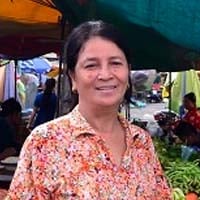The Reality of Teaching English in Cambodia
International TEFL Academy graduate Kelly Martin shares her experience as an English teacher in Cambodia and talks about her magical moments teaching English in a Cambodian village.
Written By: Kelly Martin | Updated: June 29, 2023
Written By: Kelly Martin
Updated: June 29, 2023
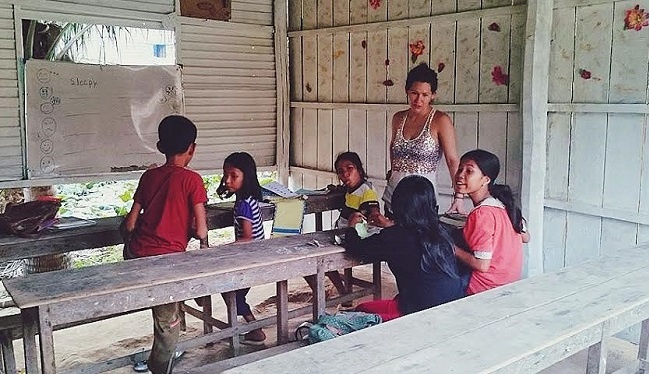
I moved to a country I knew nothing about. It’s a country the world definitely doesn’t know enough about. Using the small dose of confidence I gained from International TEFL Academy’s online TEFL certification course, I agreed to live with a local family in a Cambodian village to teach little kids and adults English.
Reality looked a bit like this
As I leave the house to get coffee, I walk by classes already in session. I hear kids yelling animal names, singing songs, or playing games. I walk further down the dirt road of the village and see kids I’ve never met bike past; they’re waving at me with wide eyes accompanied by smiles or giggles. It’s an unspoken promise of the country that I’ll receive these warm acknowledgments from the locals - children and adults alike. This is only one example of how kind these people are.
I arrive at the outdoor coffee hut where the seating is much like a bar. Flies swarm the counter tops where coffee spills along with crumbs that have been left behind. After a few months in Cambodia, you’re no longer phased by the bugs coexisting with you everywhere you go. Whether it’s flies, mosquitoes, beetles, ants…. You begin to relax. Cambodia is not a home for the meek.
>A family of a mom, dad, grandmother, and niece run the shop, therefore I see the same people consistently. I smile holding up two fingers, “coffee.. milk… take away.” Simple because these small orders are the only English they know. (I do later learn how to say it in their language, Khmer). I’m given two hand-sized plastic bags that each have the top tied together by a rubber band. A straw sticks out of it. My 25 cent coffee is cold, sugary, and perfect. I say thank you in Khmer, always earning me a smile.
While walking back home, three tiny adorable kids run up to me. They jump up and down with giant smiles on, their arms sticking up high. They want high fives as they say, “Hello!” So I give them high-fives and say hello back, then that exact cycle repeats. They’ll do this as long as they can possibly get out of me. Energy levels are through the roof, we’re all happier because of this interaction, even though we’re only saying one word!
There’s magic in these moments
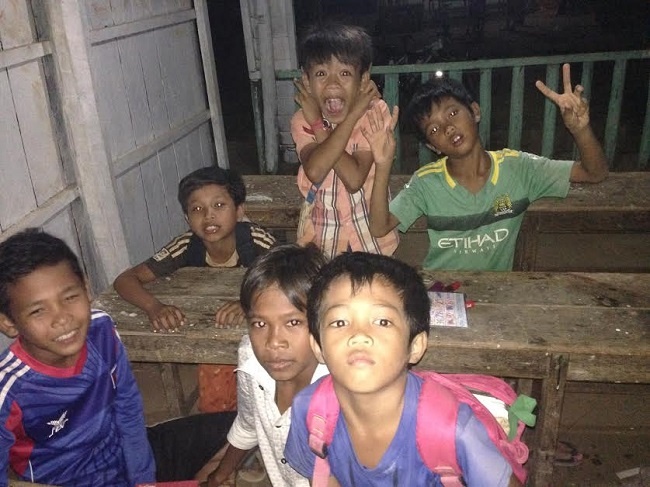
My first class of the day is for adults. All classrooms are outside; it’s 90°F (32°C) paired with humidity at 75%. My students are women who work seven days a week with most having children at home. That’s just the way most people live in Cambodia - if they don’t go to work, their family doesn’t eat. The most astounding part is that no one made them come practice English. They chose to seize the opportunity to learn for free, undoubtedly tired yet never complaining.
There are things to be learned from humans like this
For one hour the students and I do role-playing from a script I wrote. If somebody doesn’t understand a word, we play charades or I draw lots of horribly drawn pictures on the board until they understand. This group loves to laugh and loves to ask questions, always being clear about what they’re learning. These make for the best lessons.
Now for the next period, I get on a motorbike to drive 20 minutes to my next “classroom”.
During my second week, a man named Dave from Kansas taught me to drive. He’s been here a long time so by now he likes to get straight to the point when speaking to newcomers. He tells me, “This is go, this is stop. Don’t change gears. In your free time, practice in the yard.” I asked him, “Do you really think I’ll be okay driving?” He shrugged then casually said, “I don’t know. We’ll see.”
That’s how I learned to drive a motorbike in Cambodia
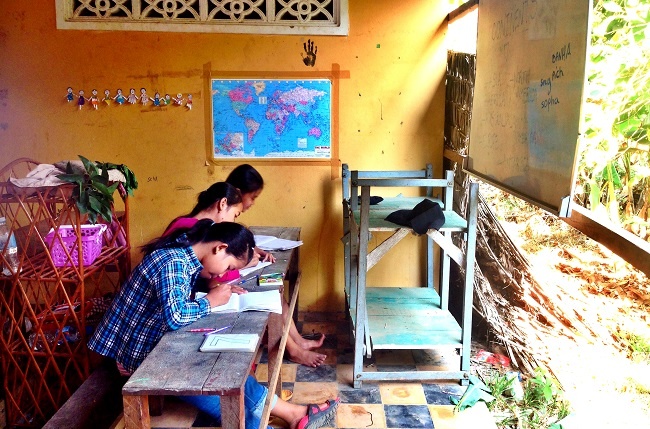
I ride next to an Egyptian man who also has a class when I do. I felt freedom in these rides. Suddenly a few weeks in, a new girl shows up. Now I have to ride on the same bike with somebody instead of next to somebody…. I’m not excited about it. These motorbike rides with Grace from Australia turned out to be my favorite part of each day. We take turns driving but no matter who it is, there’s almost a fall. We end up on crappy roads using our feet to push us along manually; we’re covered in dirt laughing hysterically. We’re two of the only foreigners in this village, so we should set a good example… Nope, Grace and I consistently make fools of ourselves, loving every moment of it, unaware that we’re creating a forever kind of memory.
At this class, three 12 year-old girls await my arrival. They are the sweetest group I’ve had the pleasure of teaching. They give me their full attention. They participate by trying their absolute hardest. The girls and I read Dr. Seuss together, go over vocabulary, go through their worksheets. We color princess pages or create glitter designs as a reward. I receive flowers or homemade jewelry as a gift.
I once arrived to see them voluntarily cleaning; the girls made brooms out of twigs and branches they found! They were sweeping the piles of leaves along with old trash, all without being asked. I join them in the cleaning, but Banya takes the brush from me then says, “Teacha, no…” Rolling her eyes at me because I’m doing it wrong.
Again proving how hard-working and sweet the people of Cambodia are
For the Khmer New Year, the family and we teachers throw a party for the students. First is dinner followed by dessert - highly cordial. Everybody then proceeds to have an intense water battle where it’s every man, woman, and child for themselves. There are tons of water guns, buckets, bowls, cups… Nobody is safe. Oh, there was baby powder thrown on everyone too.
In Cambodia, piñadas are made from clay. So instead of hitting a paper mache animal with a bat while candy falls out, you smash a solid clay vase with a stick while money falls out. Shards of clay flying around a bunch of foreign volunteers next to crazy kids is a sight I’ll never unsee.
The day with students, is over so us volunteers all have dinner together. The family who is housing us also cooks 2 meals for the volunteers daily. A few of us help in the kitchen however possible. There are between 7-13 volunteers at any time, so dinner time means sitting around a big table eating a home cooked meal with 7-13 friends casually discussing the day.
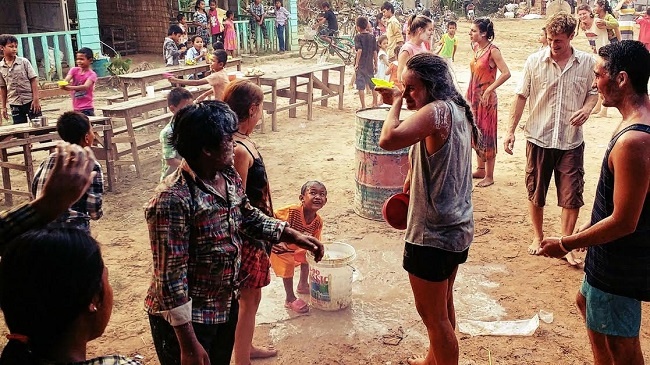
There’s magic in these moments, too.
If we’re feeling responsible, we’ll make our lesson plans at night after dinner, but more often than not, volunteers collect in a common room to spend time near each other. Some serene nights everybody has their own books, so we read silently together. Other times, we will watch lizards on the wall try to eat the beetles or other bugs. It’s common for one person to buy beer, then we sit around discussing our different cultures or telling stories or making jokes. In this part of the world we don’t just watch TV or stare at our phones. Can’t. The internet doesn’t work a majority of the time. In the third world, we connect with each other.
This formed bonds we’ve never experienced before nor could we ever recreate quite the same
By midnight everyone has retired to the dorm rooms to sleep in the cot underneath the mosquito net, inevitably sweating into our Spiderman or Hello Kitty sheets. I head up to the roof because introverts need their introvert time. I hear ducks quacking on my left from the duck farm next door. I hear crocodile roars on my right from the crocodile farm on the other side. I gain a lot of important insights about life on this roof each night, finally able to reflect on all that happens in these busy days. For the first time in my life, I’m not trying to run to the next place. That’s how Cambodia makes me feel. So out of my comfort zone, yet completely at home.
It’s 6 am and there’s blaring music from a wedding in the distance. This culture does weddings a little differently: three days of celebration playing music so loud you can’t hear the person next to you, nor can you sleep if the weddings within a mile radius. “We may as well be AT the wedding!” Grace says, confirming the ridiculousness we’re experiencing.
We go get coffee so we can do it all over again.
Go further: What are the requirements to teach English in Cambodia?
Posted In: Teach English in Cambodia, Teach English in Asia
Kelly Martin
An ITA Graduate, Kelly Martin got her TEFL certificate at age 21 and moved to Cambodia to teach English. She later moved to Thailand to continue working with kids. A budget backpacking non-degree holder proving that anyone can do it.
Want to Learn More About Teaching English Abroad & Online?
Request a free brochure or call 773-634-9900 to speak with an expert advisor about all aspects of TEFL certification and teaching English abroad or online, including the hiring process, salaries, visas, TEFL class options, job placement assistance and more.








